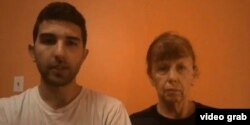The family of an American journalist held hostage in Yemen is pleading for his release in a video message after al-Qaida in the Arabian Peninsula threatened to kill him within three days if the U.S. government did not meet unspecified demands.
Luke Somers, a British-born U.S. citizen, was kidnapped in Sanaa in September 2013. The 33-year-old photojournalist had been working in Yemen for several years.
"Please show mercy and give us an opportunity to see Luke again," his mother, Paula Somers, begged in the online video released Thursday.
In a separate, undated video released earlier in the day, a man claiming to be Luke Somers said his life was in danger. "I am looking for any help that can get me out of this situation," he said.
In that video, an al-Qaida militant warns: "We give the American government a timeframe of three days from the issuance of this statement to meet our demands about which they are aware. Otherwise, the American hostage held by us will meet his inevitable fate."
In the family’s video message, Jordan Somers also disavowed any prior knowledge of the U.S. government’s recent failed attempt to rescue his brother and other hostages.
The Pentagon confirmed Thursday that it had hoped to rescue Somers and others in a joint mission with Yemeni forces late last month.
The raid in eastern Yemen freed eight hostages – six Yemenis, a Saudi and an Ethiopian – and left seven militants dead. But Somers was gone when U.S. special forces arrived on the scene. It is believed that he was moved shortly before the operation.
U.S. President Barack Obama authorized the secret mission, whose details remain classified.
It was not immediately clear if the threats are related to the raid, or to the ongoing U.S. drone strikes against AQAP, which have targeted militants but also led to civilian casualties.
The Luke Somers video, which was posted on YouTube, is undated and was widely distributed on Twitter. The family video also is widely available.
VOA’s Matt Hilburn contributed to this story. Some material for this report came from Reuters.






